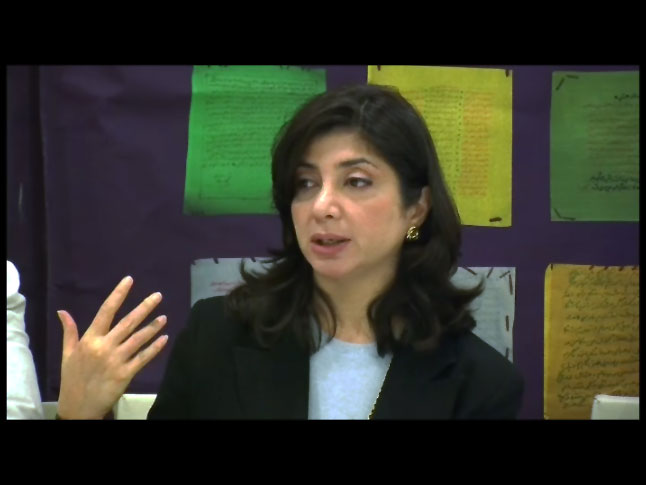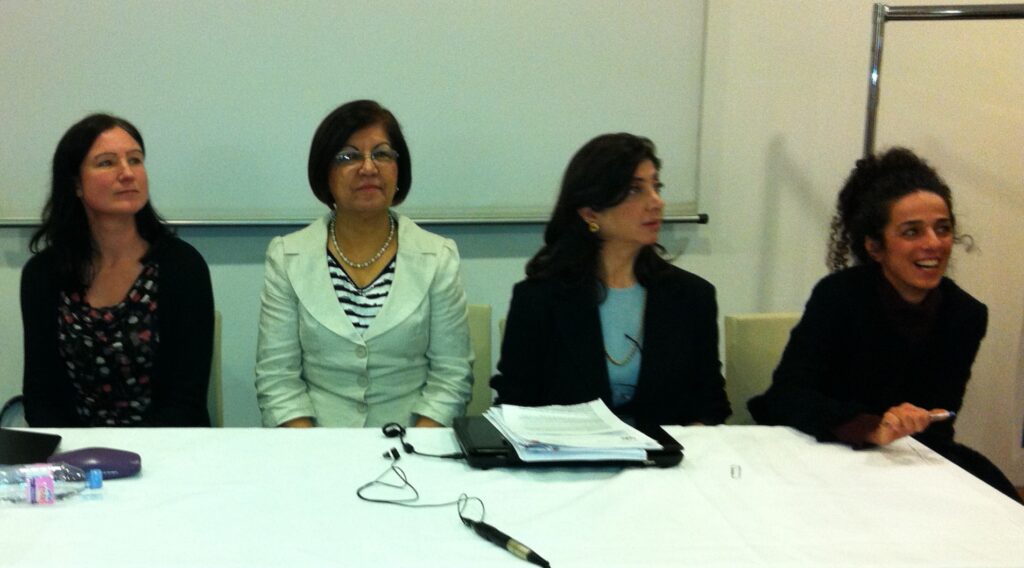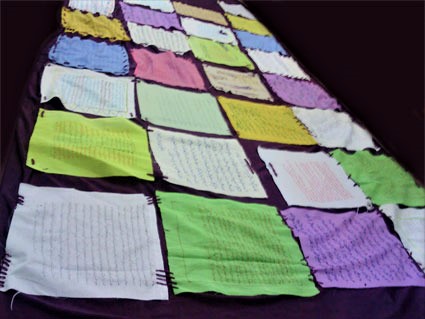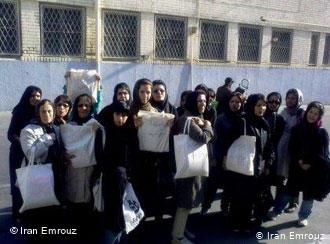حضور چهل تکه ای از رنجنامه زنان ایران در لندن
نوشته شده توسط Admin در 25 نوامبر 11در حالیکه جامعه بین المللی بر خطر دستیابی ایران به سلاح هسته ای از سوی جمهوری اسلامی تمرکز دارد، مجلس اسلامی سرگرم بحث و جدل برای قانونی کردن تبعیض مضاعف بر ۳۸ میلیون زن ایرانی است.
به مناسبت روز جهانی مبارزه با خشونت علیه زنان
۴ آذر ۱۳۹۰ – ۲۵ نوامبر ۲۰۱۱




Amnesty International – News:
۳۰ November 2011
Iranian women fight controversial ‘polygamy’ bill
http://www.amnesty.org/en/news/iranian-women-fight-controversial-polygamy-bill-2011-11-30
On a summer night in 2008, the wives of some Iranian members of Parliament started receiving phone calls.
“Would you mind if I married your husband – just for a week?” asked the female voice on the end of the line.
The callers argued that taking another wife is a Muslim man’s right. By allowing it, the MPs’ wives would be performing a good Islamic deed. Some of the wives hung up in shock.
But marrying the MPs was the last thing the callers actually wanted. In reality, they were women’s rights activists opposed to a controversial “Family Protection Bill” which the Iranian government proposed in 2007.
The activists say they discovered that at least 65 male members of the country’s 290-strong parliament had two or more wives. This is despite the fact that polygamy contravenes the International Covenant on Civil and Political Rights (ICCPR), which Iran has ratified. Article 23 stipulates that states must ensure that men and women have equal rights when marrying or at the dissolution of marriage.
If passed, “The Family Protection Bill” would reduce Iranian women’s rights even further, allowing men to take up to three additional wives without the consent or knowledge of their first spouse. Iranian law currently allows Muslim men to have up to four wives, but only after obtaining a court order demonstrating the permission of the first spouse and his ability to treat them all equally. For women who depend entirely on their husband’s income, sharing that with a second, third or fourth wife can mean severe financial hardship.
According to Shi’a Islam, Iranian men can already take any number of “temporary wives” without informing their first wife. The length of a temporary marriage is defined in advance and can last anything from hours to decades. Temporary wives generally face social ostracism, and their children may face difficulties in accessing public services such as education because if the marriage is unregistered, it may be hard for the mother to prove paternity.
Roya Kashefi of the Association of Iranian Researchers works closely with women’s rights activists in Iran.
“In Islam, family is the most important element within society,” she says.
“It’s a sacred entity and there are many articles in the Iranian Constitution that point to the importance of marriage. So it’s very contradictory to have laws that actually endanger the very foundation of that marriage with polygamy.”
Roya Kashefi has helped to organize a Europe-wide tour publicizing a banner inscribed with the tragic stories of 40 Iranian women who are second wives, temporary wives or the children of such marriages. The tour, named “Chehel Tikeh” (“Forty pieces”) is aimed at raising international awareness about the discriminatory bill.
The banner was taken to Iran’s parliament, the Majles, a year ago, although MPs refused to accept it.
Fifteen thousand women signed a petition calling for a ban on polygamy, submitted at the same time.
Women’s rights activists are urging the Iranian authorities to outlaw polygamy, grant equal divorce and custody rights and create laws tackling domestic violence.
At the moment married women in Iran can be prevented from working, leaving the country or pursuing further education by their husbands. It is difficult for a woman to divorce her husband without his consent – even if he has been violent towards her. If she remarries after divorce, she loses custody of any children.
Activists say provisions in the new bill will make it even more difficult for women to obtain a divorce, leaving thousands at risk of continued domestic violence, which is not currently criminalized under Iranian law.
Four years after its inception, the bill has still not been passed, largely because of widespread opposition from a broad coalition of women’s groups.
A ban on polygamy is unlikely to happen soon in Iran even though the UN Human Rights Committee – an expert body charged with overseeing the ICCPR – says the practice should be abolished because it violates the dignity of women. For change to happen, external pressure is needed, says Roya Kashefi.
“The international community needs to reinforce the voices of Iranian women and raise the alarm about this bill which will leave Iranian women even more vulnerable,” says Hassiba Hadj Sahraoui, Amnesty International’s Middle East and North Africa Deputy Director.
“Instead of enhancing equality between men and women, Iranian MPs are seeking to take women’s rights a step backwards and to yet again disregard international law,” she added.
=======================================================
پرده گشائی از “پرده چهل تیکه” اعتراضی به لایحه حمایت از خانواده
اطلاعیه مطبوعاتی
تاریخ و زمان: ۲۵ نوامبر ۲۰۱۱ برابر با ۳ آذر ماه ۱۳۹۰
ساعت: ۱۱:۰۰- ۱۳:۰۰
محل برگزاری:
Thorne Room, Foreign Press Association
۲۵ Northumberland Avenue, London WC2 5AP
“تو زن من هستی و باید از من اطاعت کنی”
” تو بدون اجازه من نمی توانی خانه را ترک کنی. اجازه دیدار با خانواده ات را نداری. اجازه کار و تحصیل هم بهت نمیدهم و کاری هم نمیتونی بکنی! اجازه طلاق هم که بهت ندادم و اگر تمکین نکنی من میتوانم بهر تعداد که بخواهم سرت هوو بیاورم!”
نوشته بالا نمونه ای روزمره، ازپایمال شدن حقوق زنان است که لایحه پیشنهادی حمایت از خانواده کوچکترین بهبودی در این شرایط بوجود نمی آورد و حتی با قانونی کردن چند همسری بنیان خانواده را تهدید میکند
در حالیکه جامعه بین المللی بر خطر دستیابی ایران به سلاح هسته ای از سوی جمهوری اسلامی تمرکز دارد، مجلس اسلامی سرگرم بحث و جدل برای قانونی کردن تبعیض مضاعف بر ۳۸ میلیون زن ایرانی است.
سال گذشته در همین روزها در اعتراض به لایحه حمایت خانواده (ضد حمایت) پرده چهل تیکه ای به مجلس ایران ارائه شد که برروی آن ۴۰ سرگذشت غم انگیز از زنان دوخته شده بود.
این پرده اکنون به لندن رسیده است و در روز جمعه، روز بین المللی مبارزه باخشونت علیه زنان به نمایش گذارده می شود. پس از ان با گردش در سرتاسر اروپا به امید جلب حمایت بین المللی از مبارزات زنان ایران و بر علیه قوانین تبعیض آمیز مراسم مشابهی برگزار خواهد شد. پرده چهل تیکه با همراهی پانزده هزار نام و امضاء و آدرس، با توجه به شرایط ترس و خفقان حاکم بر ایران عملی بس شجاعانه بود به مجلس ارائه شد.